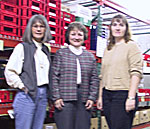Donors become clients as social service agencies see economy's impact
By Andrew Haeg
Minnesota Public Radio
October 11, 2001 The economic ripple effect from last month's terror attacks continues to reverberate through the Minnesota economy, as airlines - and the companies that rely on them - lay off more people. Meanwhile, food shelves and other social services in the Twin Cities are struggling to keep up with rising demand and a significant drop-off in donations.
One month ago, this man, who didn't want to give his name, was an airline cleaner for Northwest Airlines. He is 44 years old, and lives with his brother and sister-in-law in Bloomington.
He'd only been working at Northwest for six months. So when the airline started cutting about 4,500 jobs among its workers in Minnesota, he was one of the first to go. Now he's visiting a food shelf in Bloomington, finding help to pay for gas and looking at job postings.
"It's been frustrating, because I want to do something all the time. I want to have a skill. And right now I'm just trying to find a menial job to get through," he said.
The job cuts go far beyond the ranks of Northwest workers. Sun Country Airlines and Mesaba Airlines laid off hundreds more. What's more, state officials estimate that, for every laid off airline worker, two more in related businesses will lose their jobs. That means total job losses in the state from the terror attacks may number as high as 15,000.
Count among the casualties many former employees of Buddy's Kitchen in Burnsville, which prepares food for airline meal services.
Prior to September 11th, the company employed some 200 people. On September 14, company vice president Russ Schmidt says, airlines began calling to cancel orders for their meals.
So deep were the cancellations, Buddy's Kitchen laid off 140 employees - 70 percent of the workforce.
"It was out of our control. They understood that. And, in fact, as I stood at he door, saying 'goodbye' to a lot of these folks, there was a lot of hand shakes and some hugs and good wishes and we hope to be back," he said.
The scene was much the same at the Steiner Corporation, an Eagan-based company that manufactures equipment for airline ground support crews, such as the mobile staircases that can be pushed up to an airplane's doors, or the lift trucks used to service aircraft.
Prior to the 11th, Steiner employed some 100 people. Now the number is down to around 50. "We've had a good thriving business," says former owner and current vice president of international sales Gary Steiner. "We've had our ups and downs like any business. But when you've got 100 employees and all of the sudden you're down to 40, 50, you hate to see that happen."
Twin Cities hotels, restaurants, shippers, and waste haulers have also laid-off workers.
What's worse, many of them won't receive severance packages, like many airline workers did, so they've got no cushion at all. And even the airline employees received a maximum of six weeks pay, plus health benefits through the end of the year. So, come January, they could be facing tough times.
Social service providers are expecting an upsurge in demand for their services.
"In another month or two we're going to see more of an impact," says Frances Lubecke, a social worker at a food shelf in Bloomington, run by Volunteers Enlisted to Assist People. "It will be affecting their rent or their mortgage payments, their car repairs, day-care issues."
Lubecke and her colleagues say poor people who lost low-wage jobs were, naturally, among the first to ask for help. But now they're seeing more people, who lost relatively well-paid jobs at corporations, come through their door. In some cases, former donors have become clients.
But VEAP's food program manager, Christine Pulver, says as need has grown of late, donations have dropped by half. The explanation for the falloff, she says, is painfully simple. "Assistance has been going to the Red Cross, the Salvation Army, other assistance organizations that are dealing with needs after the New York tragedy. But people are no longer thinking of their local communities as much as they had been."
Pulver says she doesn't know how long her organization can continue serving people if its resources dwindle at the current pace. And if the state economy continues to worsen, as most analysts expect, Pulver says demand for help will soon outstrip the supply of food and other assistance.
By Andrew Haeg
Minnesota Public Radio
October 11, 2001 The economic ripple effect from last month's terror attacks continues to reverberate through the Minnesota economy, as airlines - and the companies that rely on them - lay off more people. Meanwhile, food shelves and other social services in the Twin Cities are struggling to keep up with rising demand and a significant drop-off in donations.
| |
|
|
|
||
He'd only been working at Northwest for six months. So when the airline started cutting about 4,500 jobs among its workers in Minnesota, he was one of the first to go. Now he's visiting a food shelf in Bloomington, finding help to pay for gas and looking at job postings.
"It's been frustrating, because I want to do something all the time. I want to have a skill. And right now I'm just trying to find a menial job to get through," he said.
The job cuts go far beyond the ranks of Northwest workers. Sun Country Airlines and Mesaba Airlines laid off hundreds more. What's more, state officials estimate that, for every laid off airline worker, two more in related businesses will lose their jobs. That means total job losses in the state from the terror attacks may number as high as 15,000.
Count among the casualties many former employees of Buddy's Kitchen in Burnsville, which prepares food for airline meal services.
Prior to September 11th, the company employed some 200 people. On September 14, company vice president Russ Schmidt says, airlines began calling to cancel orders for their meals.
| |
|
|
|
||
The scene was much the same at the Steiner Corporation, an Eagan-based company that manufactures equipment for airline ground support crews, such as the mobile staircases that can be pushed up to an airplane's doors, or the lift trucks used to service aircraft.
Prior to the 11th, Steiner employed some 100 people. Now the number is down to around 50. "We've had a good thriving business," says former owner and current vice president of international sales Gary Steiner. "We've had our ups and downs like any business. But when you've got 100 employees and all of the sudden you're down to 40, 50, you hate to see that happen."
Twin Cities hotels, restaurants, shippers, and waste haulers have also laid-off workers.
What's worse, many of them won't receive severance packages, like many airline workers did, so they've got no cushion at all. And even the airline employees received a maximum of six weeks pay, plus health benefits through the end of the year. So, come January, they could be facing tough times.
| |
|
|
|
||
Lubecke and her colleagues say poor people who lost low-wage jobs were, naturally, among the first to ask for help. But now they're seeing more people, who lost relatively well-paid jobs at corporations, come through their door. In some cases, former donors have become clients.
But VEAP's food program manager, Christine Pulver, says as need has grown of late, donations have dropped by half. The explanation for the falloff, she says, is painfully simple. "Assistance has been going to the Red Cross, the Salvation Army, other assistance organizations that are dealing with needs after the New York tragedy. But people are no longer thinking of their local communities as much as they had been."
Pulver says she doesn't know how long her organization can continue serving people if its resources dwindle at the current pace. And if the state economy continues to worsen, as most analysts expect, Pulver says demand for help will soon outstrip the supply of food and other assistance.



